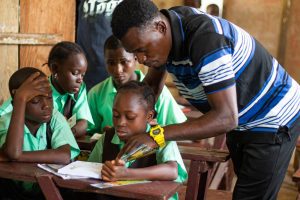 In Liberia, the quality of education is deeply intertwined with the proficiency of its educators. The Teaching and Learning in Fragile Contexts (TLFC) Project is working to improve this and is working with teacher training institutes (TTIs) by placing student teachers from the TTIs into schools for practical experience.
In Liberia, the quality of education is deeply intertwined with the proficiency of its educators. The Teaching and Learning in Fragile Contexts (TLFC) Project is working to improve this and is working with teacher training institutes (TTIs) by placing student teachers from the TTIs into schools for practical experience.
However, a significant number of host teachers in these schools, despite their classroom experience, lack formal teacher training and the minimum teacher qualification themselves. To improve the educational standards and ensure confidence and effective mentorship, CODE and our Liberian partner, WE-CARE, are helping host teachers undergo the C-Certificate training program and receive valuable teaching qualifications themselves.
Following the first round of training in November and December, the second round of training for host teachers took place from February 10 to 14, 2025 (during the national academic school break), across six locations: Harbel, Sinje, Monrovia, Paynesville, Kakata and Tubmanburg.
Eighty-six untrained primary in-service teachers (25 females, 61 male) from 28 practicum schools attended the C-Certificate Teacher Training. The training was facilitated by 18 trainers:
- 6 certified WE-CARE trainers (3 women, 3 men) as lead trainers
- 6 Network Leaders (2 women, 4 men) building their training skills
- 6 Teacher Educators (all men) developing skills for long-term program support
At each training venue, the training began and ended with pre- and post- assessments on the training contents, interspliced with daily exit card activities. At the end, participants were given tasks to begin to develop their teaching portfolios.
Purpose and Objectives
The training was designed to equip host teachers with C-Certificate curriculum content and pedagogical skills aligned with Liberia’s Professional Standards for Teachers. Key objectives aim to transform their classrooms and benefit their students:
- Enhancing classroom instruction through effective teaching strategies.
- Strengthening subject knowledge in language arts, mathematics, science, and social studies.
- Encouraging child-centered and active learning teaching methods.
- Instilling a sense of professionalism, ethics, and continuous learning.
- Training teachers in assessment design and student evaluation.
Training Focus Areas
The five-day training followed a structured agenda with daily themes:
- Fluency & Interpretation: Education philosophy, professional standards, child protection, child development.
- Interpretation & Engagement: Perceptual styles, multiple intelligences, vocabulary development.
- Interpretation & Vocabulary: Reading comprehension, mathematics facts, physical features of Liberia.
- Professional Content: Classification of animals, Liberia’s history, advanced pedagogy, lesson planning.
- Assessment & Evaluation: Assessment design, evaluation techniques, classroom management, reflective teaching.
The delivery of the above C–Certificate curriculum content was done using active and participatory strategies that align with the TLFC project strategies:
- Think-Pair-Share
- Read-Aloud
- Sketch to Stretch
- Semantic Map, Reading & Discussion,
- RAFT (role, audience, format, topic),
- DRTA (directed-reading-thinking activity)
- I Do/We Do/You Do
- Brainstorming
- KWL (know, want to know, learned)
- Guided Practice, Independent Practice,
- DRA (directed-reading activity)
- Advance Organizer
- Word Conversation
- Pair Reading/Pair Summarizing
- Mix/Freeze/Pair
- Word Hunt Opposite Game
Training Outcomes: Improved Teaching Quality
The training led to improvements in the host teachers’ teaching quality as demonstrated during the adaptation of demo lessons and micro-teaching by participants:
- Improved subject knowledge and adaptation of student-centered pedagogical approaches.
- Greater focus on gender-responsive teaching and literacy integration in lesson presentation.
- Enhanced ability to design and implement assessments.
- Increased understanding of the ABC instructional framework to promote active learning and critical thinking.
Overall, the training strengthened the capacity of host teachers to support student teachers in practicum schools and to foster a more effective and engaging learning environment for primary school students.
There will be continuous learning opportunities for the teacher in training through assignments and handouts that will be given to them between workshops. These teachers are also receiving in class monitoring and mentoring. This is a critical step towards improving the quality of education in Liberia.


